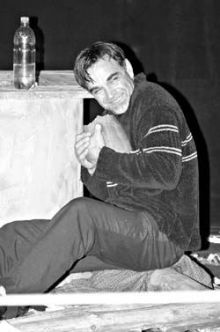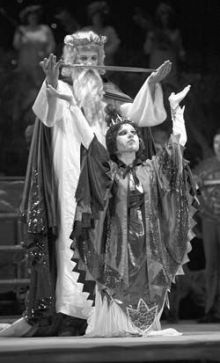A visit to the theater is always a grand occasion. There is a lot of light, the gilded hall glows for the spectators. There is great music, a well-heeled audience, and flowers. The theater is a departure from the routine, a beautiful event in the monotonous flow of daily life.
The theater is still a feast even without gilt and music, without beautiful dresses and colors. It is a miracle of one person’s transformation into another; it is life’s transformation into art. This is the miracle of the game — and playfulness lies at the heart of a person’s nature. For a man is not only a thinking man, homo sapiens, but also man the player, homo ludens. That is why the theater is one of the most ancient arts, dear to man since time immemorial — in the past and the present, in dreams, and for all time.
Theater lives everywhere according to these eternal laws. It lives in central Ukraine. Here the inter-regional department of the National Union of Theater Workers of Ukraine (NSTDU), which encompasses Dnipropetrovsk and Zaporizhia oblasts, including the theaters of Dniprodzerzhynsk, Pavlohrad, and Kryvy Rih, founded the Sichoslavna theater festival, competition, and prize.
Sichoslavna is the female persona of the Zaporozhian Sich, its soul and inspiration. The Zaporozhian Cossacks, like everyone in Ukraine, had a special devotion to the Blessed Virgin Mary, her protection, and the Feast of the Protection (Pokrova). That is why the symbol and the Grand Prix of the Sichoslavna Prize is a bronze female figure wrapped in a veil fluttering in the wind. You cannot see her face — she has many faces, just like each theater has a different face, its features changeable and constant, unexpected and predictable, often strange. Sometimes they are grimaces, at other times they reveal the harmony of beauty. Solving this mystery is the main fascination of the theater in general and the Sichoslavna Theater Festival and Competition, in particular.
In the spring, at the end of the theater season, after all the main premieres have been staged, theaters submit their best plays to the careful scrutiny of the jury, which includes distinguished members of the theater community — stage directors, actors, and theater critics — local figures, invited guests from Kyiv and other regions of Ukraine, and abroad. Moving from theater to theater during a ten-day period, the jury members watch and discuss up to 25 or more plays, including dramas, musicals, puppet theater, and student productions. These discussions have become a sort of master-class for actors, a mirror in which they see themselves in the context of the theater process in Ukraine and the world.
What is unusual about the Sichoslavna festival is that there are two competition sections, one for adults and one for young people, who vie for the youth prize, the Hope of Sichoslavna. During the 15 years of the festival’s existence, many young prize winners have gone on to become recognized masters in the field of theater.
This annual festival is made possible by support from the Dnipropetrovsk Inter-Regional Department of the NSTDU, headed by Yurii Chaika, chief stage director of the Dnipropetrovsk Opera and Ballet Theater, and Maryna Protsenko, responsible secretary of the department, in cooperation with the local authorities and administration of both oblasts, their industrial and humanitarian complex, civic organizations, press, radio and television. The government not only provides assistance to the festival, but is very interested in its results.
The Virymo! Theater, which developed under the leadership of Volodymyr Petrenko since its amateur days at the Palace of Pioneers, has won different festival prizes. As a result, this theater troupe has become the Dnipropetrovsk Municipal Theater. The Zakhava Theater of Pavlohrad, headed by Anatolii Reva, has received much more support from the local authorities. Even the local authorities of Kryvy Rih, who are generally remote from cultural interests, have been compelled to sit up and take notice of Oleksandr Belsky’s unique Akademia Rukhu Theater.
This spring brought the news that Mykhailo Melnyk of Kryk, Dnipropetrovsk’s one-man theater, was awarded the National Shevchenko Prize. Melnyk is a past winner at the Sichoslavna festival. His colleagues, mentioned above, are all Grand Prix winners of the festival in different years.
The awards ceremony, with its judiciously awarded Grand Prix and other prizes, is a magnet for theatergoers, government figures, and friends of the theater in the central Dnipro region. Thanks to the refined style of the Vie Theater from Island of Khortytsia (director: Viktor Popov) Khortytsia now has its own festival.
Although the staging of the most interesting opera productions of the Dnipropetrovsk Theater may be inferior to the National Opera of Ukraine, its level of stage direction is often superior in terms of the singers’ vocal and dramatic mastery. The Dnipropetrovsk-based theater Actors and Puppets presents the refined arts of the puppet theater.
Among the other competitors were the theater of song from Zaporizhia (director: Olena Aleksieieva), the intellectual but unpretentious little theater on the ground floor of an apartment building in Dniprodzerzhynsk, called Desiaty Kvartal (director: Liudmyla Kostenko), and the student performers of the Dnipropetrovsk Theater College, and other budding actors and masters. Thanks to the Sicheslavna festival, the reputation of the THEATER AS IT IS has grown by leaps and bounds and become a favorite of theater lovers.
This year the theatrical holiday in Dnipropetrovsk was especially beautiful. The packed hall of the Opera Theater was filled with theater personalities from the city and region. During the opening ceremony greetings were read from the local authorities, the Buriat Theater of Opera and Ballet, which is coming on tour to Dnipropetrovsk, and guests from Kyiv. Awards, honorary titles, and prizes were distributed.
The ceremony was also attended by Metropolitan of Dnipropetrovsk and Kryvy Rih Adrian of the Ukrainian Orthodox Church (Kyiv Patriarchate) and assorted clergymen, who awarded prizes on behalf of Patriarch Filaret of Kyiv and all Ukraine- Rus’: a pair of blessed icons of the Mother of God and the Savior, the Order of Archangel Michael (for men) and the Great Martyr St. Varvara (for women). Fedir Maistrenko, an artistic molding specialist from Pivdenmash, who casts the bronze statuette of Sichoslavna, was awarded the Order of the Grand Prince Volodymyr. The contemporary church is thus building a bridge of cooperation between the world of faith and the world of arts for the spiritual renaissance of the Ukrainian people.
The Sichoslavna Festival is 15 years old, the youthful age of our state, the age of early youth. It is appropriate to recall these poetic lines:
My country is an adolescent —
Create, invent, and try!
This is a beautiful formula for any kind of creative activity: state, scientific, and theatrical. We will create, invent, and apply our efforts together, for the sake of Ukraine, the theater, and the future.








